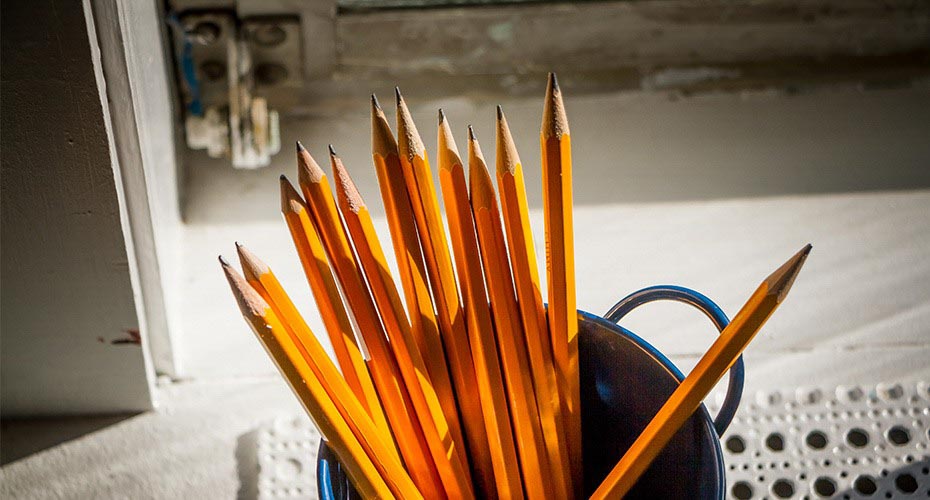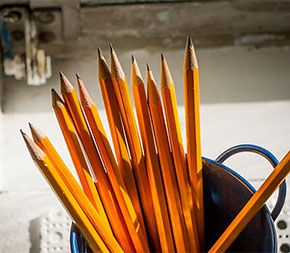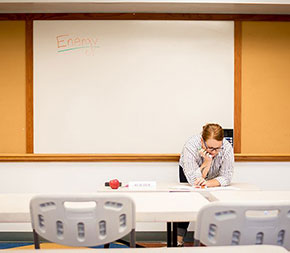What It’s Like to Study Elementary Education: A Student Interview

by All Star Staff


Sarah Golchert
Graduate, Elementary Education Program
University of Kentucky College of Education
Lexington, KY
When Sarah Golchert was not much more than a kid herself, she enjoyed watching the children of friends and family members. She liked answering their unending questions and always took time for “teaching moments.” Few were surprised to hear of her plans to attend the University of Kentucky for a degree in elementary education right out of high school.
Variety in Elementary Education
After gaining entry to the University, she was accepted into the College of Education and began her schooling. She was surprised from the start at the variety of subjects the curriculum covered and the amount of versatility required of elementary school teachers.

“We are required to take a wide variety of classes so we can teach the core subjects, but we also take classes in music, art, physical education and health education,” she mused. “In elementary education you really have to be versatile and teach all subjects as a core content teacher. There are exceptions for music and physical education teachers, but one usually teaches all subjects in the classroom.”
A surprisingly pleasant aspect of her degree in elementary education was the educational psychology curriculum required for graduation. Although Sarah showed an early penchant for understanding children, she now gets to examine how they think and process their interactions from professionals in the field. “Although we go through these experiences with kids daily, just having their actions described and explained by psychologists is really interesting,” she remarked.
Life in an Elementary Education Degree Program
Having known her major and education specialty from the beginning of her college career, Sarah plans to graduate in four years. However, with the list of required classes and the number of prerequisites, it is not uncommon for an elementary education student to take five years to graduate.
Like most elementary education degrees, class schedules and credit load at the University of Kentucky’s College of Education are highly flexible. “You can take from 12 to approximately 19 credit hours per semester. These classes will be for either one hour on Mondays, Wednesdays and Fridays or for an hour and a half on Tuesdays and Thursdays. They can begin from as early as eight a.m. or as late as around six at night.”
Sarah noted that the majority of students getting a degree in elementary education are female. “There are a handful of males interested in the program,” she said with a smile. But she recovered quickly by praising the motives of her fellow classmates, male and female alike: “Most all of the students here love kids and are passionate about the future intelligence of America’s children.”
Hands-On Experience
Sarah’s favorite aspect of studying to become an elementary school teacher is holding observation hours at different schools in the area. “When I go, I get to see different discipline styles and methods of teaching and lecturing. Each teacher I observe shows me a different way to run a classroom. I’ve seen many unique and varied methods of conveying material to children this way.”
However, she never comes to observation classrooms without a few tricks of her own. She recounted a time when she was helping a 4th grade classroom learn to read a thermometer with a computer program. One kid, James, seemed to take a liking to her and raised his hand when Sarah neared his desk as she circled around the classroom.
He couldn’t seem to understand how to read the gauge when temperatures were in the negatives. So she asked him if he knew how to read a line graph. He did. She told him to turn his head 90 degrees to the left and read the thermometer just like he would a line graph. “After that, he got each thermometer question right,” she exclaimed, “and each time I saw him turn his head to the side, I knew what kind of problem he was working on!”

Considering a Degree in Elementary Education
Clearly, the rewards of an elementary teaching career are many. But Sarah warns against jumping in too soon. Her suggestion for those considering an elementary school teaching career? “Work at a summer camp or volunteer at a place where you can work with children who are away from their parents. Trust me! They are completely different without their parents around!”
When asked what kind of people should consider a degree in elementary education, she chuckled and said, “You need to have the patience of a sensei and unconditional love.” But when asked the hardest part about studying for a degree in elementary education, she perked up immediately, “Oh that’s easy. It’s not being the teacher–yet!”



